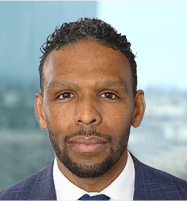
Director, Clark Construction Group
As a Director at Clark Construction, covering Southern California, Joss Tillard-Gates ensures Clark Construction wins work in the region, delivers on Clark’s commitment to maximizing its opportunities to partner with small and diverse business entities for each of its projects, supports workforce development programs, and grows existing relationships while creating new relationships with industry partners throughout Southern California. Prior to joining Clark Construction in 2022, the bulk of Joss’s experience was in policy and government as he spent time as a registered lobbyist representing Los Angeles County, held the role as Legislative Director for a State of California official, while also leading in various capacities on political campaigns, including serving as Deputy Director of Policy for Mike Bloomberg 2020. Joss holds a bachelor's degree in political science from the University of Connecticut, a Juris Doctor and Real Estate Law certificate from Western State College of Law, and a Construction Management certificate from UCLA. He also serves on the following boards: Los Angeles Economic Development Corporation, Los Angeles Business Council, Build California, ACE Mentor Los Angeles and Orange County, Crete Academy, and Urban Alchemy. While Joss has made Los Angeles his home, he is from Kansas City, Missouri and loves going back home to enjoy his family’s barb-b-q restaurant, Gates BBQ.
Joss Tillard-Gates is doing things WerthWatching:
- Maximizes opportunities to support small and diverse businesses as a director with Clark Construction Group
- Shares his leadership advice as a featured speaker with NetWerx: “I’ve always thought about leadership as leading from the front, and planning for the success of those that are following your guidance.”
- Joss is supporting the power of mentorship by matching donations made during the upcoming UConn Gives 36-hour fundraising campaign
What sparked your interest in policy, community affairs and construction?
It was never lost on me that my family was in the service business although most would say that we are in the restaurant business, which is true. But our longevity stems both from our product and our service. Couple that with my attending a Jesuit high school, The Rockhurst High School, and living a life of “servant leadership” was pretty much ingrained in me during my formative years. Construction has come into play because I’ve also had a keen interest in real estate and development, watching my grandfather operate the real estate company over the course of my life. Each of his restaurants is a free-standing building, which is required to build a bar-b-q pit, and he is involved in the process from start to finish. From financing, to design, to construction, to completion. The construction industry gave me the opportunity to move out of the public sector in my career, while also providing a more tangible outcome for my work.
You are part of a group of generous alumni matching donations made during the upcoming UConn Gives. Why did you choose to support The Werth Institute, and how does its mission resonate with your experiences and values?
I have a tremendous amount of respect and admiration for the Werth Institute, its mission, and its leadership in David Noble. As more and more of our tasks are being automated, and will continue to be automated moving forward, people who fill voids in various markets and meet consumer needs will be the driving force in our society. Entrepreneurship and small business ownership have always been the bedrock of our society and our economy and I’m happy to support Werth as it fosters that environment at the University of Connecticut. I’ve always had an interest in entrepreneurship, both because of the experiences of growing up in an entrepreneurial family, and because entrepreneurship gives you the opportunity to reach your full potential in many ways. It’s a growth opportunity professionally, emotionally, ethically, mentally, etc. etc. and the idea of growing and bettering myself is fundamental to my life.
Why is giving back important to you, both personally and professionally?
Giving back is important because I learned very early in my life that when you have more, you should do more. That doesn’t mean charity and sharing of resources should be limited to the wealthy, which I certainly am not. It does mean, that if you really care about a cause, a community, or even a person, you must consider the excess resources you may have and whether you’re really willing to share them. I’ll share a short story to help illustrate my point. When I was a young kid, let’s say 6th grade, I got a pair of basketball shoes for Christmas, among other gifts. One of my best friends, in a less fortunate position, was spending Christmas morning at my house and my mother must have noticed something in his mood or a look on his face when he saw me open that box of shoes. In that moment, my mother told (not asked) me to give him the shoes. They were now his gift. I did, and I’ll never forget it because my friend died in a tragic car accident that following spring. The point is this, if you love people, tell them. If you care about people, act like it. All of our time is limited, and we should be sharing the good things as much as we can.
How has your entrepreneurial mindset influenced your approach to leadership?
Watching my mother, grandfather, and others in my family that drive the family business on a day-to-day basis helped me understand that you must earn the right to be a leader. It involves setting a high standard, meeting it, then doing all you can to help others reach it. Leaders have to plan, teach, encourage, motivate, and act among so many other things. My mother has both an MBA and a PhD and does not let that stop her from frying French fries in one of our restaurants because she knows that ultimately, she’s responsible for the overall mission of the business. Which is to provide a high-quality product with high level service. For reasons like that, I’ve always thought about leadership as leading from the front, and planning for the success of those that are following your guidance.
As a past guest speaker in the UNIV 1820 Conversations in Entrepreneurial Leadership course, what advice do you share with students interested in entrepreneurship or aspects of entrepreneurship?
Entrepreneurship is not easy, but it’s worth it. Don’t get distracted by what looks like success on social media. Find something that you’re incredibly passionate about and go for it. You might fall, and you might fail, but when you go all in the lessons seem to stick. So ultimately, either you’ll end up with a successful business out the gate, or you’ll learn enough lessons to direct your steps to the business ultimately. Just don’t lose confidence and determination. Success doesn’t have a deadline.
Can you share an instance where you took a risk? Did it pay off? If not, what lesson did you learn from the experience?
Without going into many details, prior to my time at Clark I took the chance to become a real estate investor on a large project out of state. It was the first time I probably took a large sum of money to invest in something like that and ultimately the investment was lost, and the outcome was unsuccessful. But I’d compare the lessons to about two years of undergrad in less time and for less money, so I think I still came out ahead. Perspective is important.
How did your time at UConn prepare you for where you’re at today?
My time at UConn prepared me for where I am today by putting me in an environment where I didn’t know anyone else. I didn’t know of anyone else that was from the same time zone I was from when I first got to UConn. So, it was very important for me to build relationships both with my peers and with faculty. The ability to create relationships has been foundationally important to any amount of professional success I have had up to this point in my life.
What’s your favorite UConn memory and how has your connection to the university influenced your professional journey?
My favorite UConn memory is without a doubt the time I spent as a UConn football player from 2006-09. There were plenty of highs and plenty of lows, but the relationships and bonds that grew from that experience are second to none. Half of the groomsmen in my wedding were teammates, my oldest daughter’s Godfather was a teammate, a teammate married one of my cousins after moving to Los Angeles (lol). Ultimately, it has influenced my professional journey because sports and teams bring people from different backgrounds together to meet your ultimate goals. Football is the consummate team sport. It teaches resilience and selflessness, which is something I bring with me professionally.
Which business tool or resource do you recommend to others, and why?
Read the autobiographies of entrepreneurs, champion caliber athletes, world renowned artists. After that, read philosophy and books like Antifragile by Nassim Nicholas Taleb. These resources will provide a deep understanding that what you’re trying to accomplish is possible (many of the people will discuss traumatic hardship in their early years) as well as the shared mindsets, levels of determination, and personality traits that make these same people successful. Biographies and philosophy are like historical playbooks of how to create your own success and all the traits are transferrable to any industry or field.
What’s your go-to karaoke song?
My go to karaoke song is “I’d Rather Be with You “by Bootsy Collins. Classics never fail.
What are you passionate about outside of work?
I’m passionate about my family. In addition to the family I grew up with in Kansas City, I am now married and have daughters. Family is everything to me. My wife, Alexandria, is an entrepreneur and licensed therapist, and is the founder of HerHealing LA. My oldest daughter, Sadie, will be turning 4 this summer and is killing it at school. And Stella, the 5-month-old, has already done multiple modeling gigs…very LA lol.
